Top Trampoline Tips for Holiday Home Owners
For families on holiday a trampoline can be a desirable addition to your holiday home’s garden. Whilst bouncing up and down feet in the air will provide plenty of fun you’ll want to ensure you have the mechanisms in place to manage and minimize the risk of injuries to your visitors. One hospital recently reported that more than 100 children were admitted to their A&E during the summer months as a result of trampoline related injuries, many of which were sustained on trampolines without any netting or adult supervision. Our top trampoline tip is to seek the opinion of your holiday home insurance provider to ensure that they will extend liability cover for your paying guests to include the provision of a trampoline. 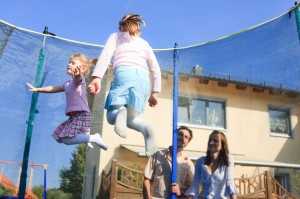
Top Trampoline Tips – Key Facts
- There are more than 10,000 trampoline related injuries every year.
- 75% of injuries happen when more than one person is on the trampoline, with the person lightest in weight 500% more likely to be injured.
- Children under the age of six are most likely to be injured on a trampoline.
When buying your trampoline what do you need to look for?
No matter where you buy your trampoline, ensure it carries the CE or GS safety mark and that all of the springs are clearly covered by safety pads. The padding should be a different colour to the mat to make it clearly visible and if possible, look to invest in a design that includes netting so as to minimise the threat of visitors falling from the trampoline and sustaining injury.
Where to put your new trampoline
Early thought should be given as to where in your garden your trampoline should go and what size you’re able to fit in to this area. The trampoline when erected should have a safe and clear zone of at least 2.5 meters on all sides. This space should be free from trees, branches, fences, overhead cables or anything that could cause a hazard, including bicycles or other toys. Don’t be tempted to buy a trampoline larger than the size you can safely fit in your garden and ensure the manufacturers instructions are followed when you put it up and also when you take it down.
Finding the right ground
Your trampoline should ideally be placed on ‘soft energy-absorbing ground’ such as wood chip or soft grass. Make sure you’re trampoline doesn’t span different types of ground and if you do have to place your trampoline on harder ground such as concrete or tarmac ensure there is always crash matting placed on the surrounding area to reduce the potential of injury from falling.
The importance of supervision
Whilst adult supervision is no guarantee of injury free play a spotter will often be able to greatly reduce the risk by picking up on potential issues before they arise. We recommend that our holiday home owners don’t have a trampoline in their garden unless they live adjacent to the property, such as would be the case for a holiday cottage complex, in order to not only manage risks during the summer months but also maintenance issues during the winter.
Maintaining your trampoline all year round
Whilst the number of bouncing children will increase greatly during the summer your trampoline will be with you all year and should be taken down during the winter and when not being used. This will avoid potential rusting and degrading of the quality of your trampoline, along with preventing it being blown away with the wind. There have been reported incidents of trampolines being blown in excess of 50 meters, causing large amounts of damage to properties and cars on the way. Ensure that your trampoline is dismantled and stored in line with the instructions provided by your manufacturer.
ROSPA Trampoline Guidance
For more information and guidance on trampoline safety please visit:
For more information on your holiday home insurance please get in touch with our dedicated team on 01237 429444.
This article has been created as generic guidance for holiday home, cottage and holiday cottage complex owners and does not constitute legal or insurance advice. If you have any questions relating to health and safety management and the provision of a trampoline for use by holiday letting guests you should discuss them with your broker or insurer.
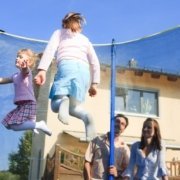
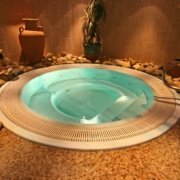
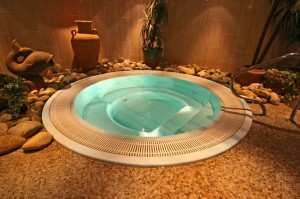

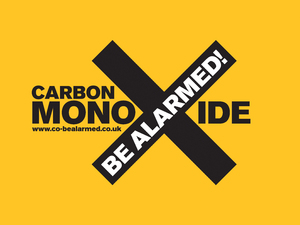
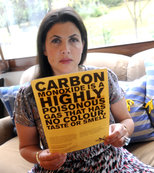
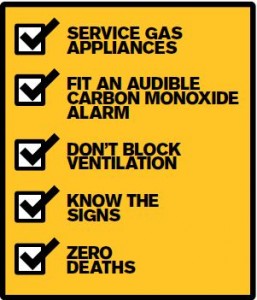






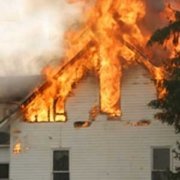
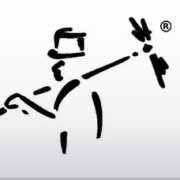
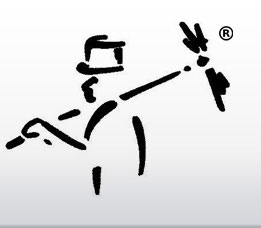
 Flood Alerts And Warnings In Force – be flood aware! The UK’s weather certainly keeps us on our toes. First drought, followed by the wettest April in a century has resulted in the Environment Agency issuing 130 Flood Alerts (Flooding is possible – Be Prepared) and 33 Flood Warnings (Flooding is expected – immediate action required) across England and Wales at midday on Mayday 2012.
Flood Alerts And Warnings In Force – be flood aware! The UK’s weather certainly keeps us on our toes. First drought, followed by the wettest April in a century has resulted in the Environment Agency issuing 130 Flood Alerts (Flooding is possible – Be Prepared) and 33 Flood Warnings (Flooding is expected – immediate action required) across England and Wales at midday on Mayday 2012. 